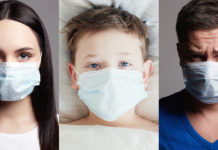Tag: covid-19
COVID-19: How has it affected young people?
Early reports out of China showed that elderly people and the chronically ill were most vulnerable to Covid-19. Yet an alarming number of young people in the United States have been hospitalized with severe infections. According to the Centers for Disease Control and Prevention, nearly 40% of American Covid-19 patients who were hospitalized were under 55 – and 20% were between ages 20 and 44. And in rare cases, even children have died after falling ill with Covid-19. – The Guardian.
COVID-19: What if we received bad news in a void?
What if there was no good news to give us confidence that we could get through the troubles facing us now? What if there was no good news to assure us that we are cherished, loved and supported, that we are not alone?
COVID-19: How do you recognise a conspiracy theory in a pandemic?
The Colorado beetle that threatened the potato crop of the former GDR in 1950 might have been an American method of sabotage against the Eastern bloc. A sinister German plot might have been the cause of the Spanish flu. Perhaps AIDS emerged as a biological weapon developed by the United States and has been tested on prisoners and minorities. Every crisis humanity has ever faced has had its own conspiracy theories and its own conspiracy theorists.
COVID-19: What I have learned from my Italian friends
Antonio is a grandfather of 69 years old. For 40 years, he has worked as an internist. Just a few days ago, his plans for a quiet retirement suddenly changed. Out of his own free will, Antonio decided to return to work as a doctor in order to help patients suffering from COVID-19.
COVID-19: Lessons on happiness from an invisible teacher
When life takes a bad turn, we are often tempted to console ourselves with nostalgia. We begin to look at the past in a different light. We realise that we had been too demanding of ourselves, of others, of the world. That even though we had everything we needed we still wanted more. That we were always looking for something else, without paying attention to the essence of things.
COVID-19: Could giving up ever be the key to success?
Pray! If not to God, then to a god. Admit that we are defeated, because this is the first step towards victory.
Life after lockdown: a return to the rat race?
On any given day, a typical person checks the clock several dozen times.
COVID-19: The new mirror in which we look at our parents
How can we encourage the elderly during this time? How can we help them understand that we don't want to lose them and that, although it's hard for them, we didn't abandon them. I have an elderly mother and, honestly, it would help me a lot. Can you write for me?
Telemedicine. How to get the most out of it
While an increasing number of family physicians and private health networks offer online consultations, it's helpful to better understand telemedicine, the opportunities it creates and its limitations.
COVID-19: How does anxiety affect us?
A global crisis situation, such as that generated by the current pandemic, is a complex picture with many variables bringing high levels of emotional distress. During a pandemic, many people will face a wide range of reactions and emotions, and the psychological impact will often be greater than the medical one.
COVID-19 and our low-risk but endangered children
All COVID-19 statistics lead to the same conclusion: the young ones, our children, are at the lowest risk of getting ill or dying from the virus. That’s comforting. But the pandemic does pose a certain danger to them.
COVID-19: The third signal
I thought to myself: Is there an alarm or is it an end of day signal?
COVID-19: Seeds of goodness in the midst of the pandemic
In recent weeks, we have all experienced a state of unrest. Our eyes have been on the rising numbers of COVID-19 infections, as we try to comply with the restrictions imposed by the state of emergency. But we have also had bright moments, moments we might not have anticipated just a short time ago.
COVID-19: Social distancing and the new ways to love amidst the pandemic
The epidemiologist Marc Lipsitch thinks that social distancing will have to continue, in one way or another, hopefully in milder forms and in correlation with other activities. Lipsitch is the author of a study suggesting that social distancing may be necessary, possibly intermittently, until 2022.
COVID-19: Hope ordinances and a divine governance
Fines, military ordinances, police and army patrolling the streets – this is the reality we have suddenly found ourselves living in. It is a tightening reality, a rigid corset-like structure of rules.


























